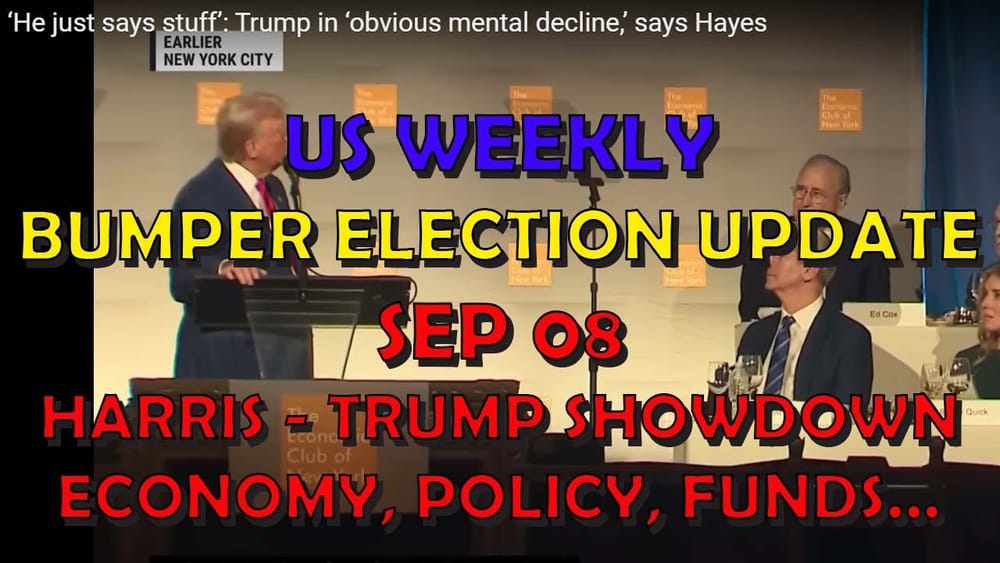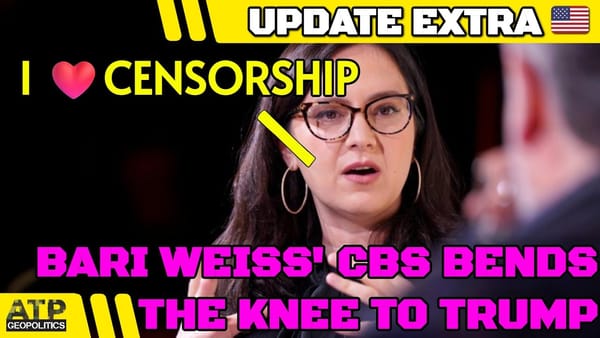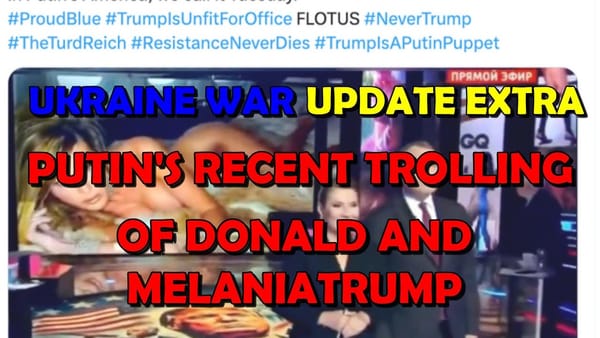US Politics BUMPER Election WEEKLY Extra: Harris - Trump Showdown Update
Table of Contents 📖
"It doesn't take much in the margin of this election. And this is an opportunity for the vice president to talk to Republican voters, too, to your Nikki Haley primary voters, to Reagan Bush voters, to people who don't like Donald Trump, to say, you may not like me. You might not know me very well. I'm a Democrat. You may not have voted for me before. And you might not want to vote for a Democrat. But please listen to these respected figures in your former party who think Donald Trump is a threat."
Hello Team
🎦 00:00-00:39⏩
Jonathan welcomes viewers to the US Elections Special, a Trump-Harris showdown update. He mentions there's a lot of news to cover and the video will be long with many different topics. He also alludes to the fact that he will be discussing Russian interference in the US election.
Return to top⤴️
Russia Interference in US Election
🎦 00:39-01:27⏩
Jonathan discusses the evidence of Russian interference in the US election, highlighting the Department of Justice's indictment of several individuals and entities connected to Tenet Media. This organization is accused of acting as a shell company for the Russians to launder information through the US electorate. Jonathan points out that Lauren Chen and her husband, right-wing influencers, are implicated in this scheme, having allegedly used the money to pay YouTube influencers who unwittingly spread Russian disinformation. He expresses concern about the implications of this interference for US democracy.
Return to top⤴️
Republican Response to Russian Interference
🎦 01:27-02:45⏩
Jonathan notes that the Republican Party, particularly Fox News, has downplayed the seriousness of Russian interference in the US election, attempting to portray it as a Democrat scheme to muddy the waters. He emphasizes the serious threat this interference poses to US democracy.
Return to top⤴️
Trump Downplays Russian Interference
🎦 04:05-05:39⏩
Jonathan shares a quote from Donald Trump, who downplays the threat of Russian interference. Trump characterizes the issue as almost humorous, suggesting it's a recurring tactic by the Democrats. Jonathan criticizes this response, arguing that it is dangerous and undermines the integrity of US democratic elections.
Return to top⤴️
Trump Acknowledges Losing 2020 Election
🎦 05:39-06:36⏩
Jonathan discusses Trump's recent acknowledgement that he lost the 2020 election. Trump, in an interview, conceded that he "lost by a whisker," which has sparked fallout among his supporters who have embraced the "stolen election" narrative. This admission contradicts Trump's previous statements and has created a divide within his base.
Return to top⤴️
Nick Fuentes Criticizes Trump
🎦 06:36-09:43⏩
Right-wing white nationalist Nick Fuentes has expressed anger at Trump's admission of defeat in the 2020 election. Fuentes questions the justification for the "Stop the Steal" movement and the actions taken by its supporters, including the January 6th Capitol riot. He sees Trump's recent statements as a betrayal of his supporters' efforts and sacrifices. Jonathan, although not a fan of Fuentes, acknowledges the validity of his criticism and anticipates this could impact Trump's support among certain segments of his base.
Return to top⤴️
Close Election
🎦 09:43-10:27⏩
Jonathan discusses the tight margins in the current election. He cites polls that suggest this is the closest election in history, with less than a 5% difference between the two parties at any given time. He mentions that the debate is highly anticipated and that both campaigns are strategizing accordingly.
Return to top⤴️
Debate Rules
🎦 10:27-13:56⏩
Jonathan talks about the debate rules. He explains that the Harris campaign initially wanted rules similar to those implemented for the Biden-Trump debate, which included silencing Trump's microphone to allow Biden to speak uninterrupted. However, the rules ultimately favoured Biden, with Trump's microphone being muted when it was Harris' turn to speak. Jonathan discusses the strategic considerations behind these choices, highlighting that Trump's team anticipated his tendency to interrupt and talk over his opponents. He speculates that these rules could benefit Trump, as his tendency for unhinged behaviour could play into the Democrats' strategy.
Return to top⤴️
Trump's Campaigning Strategy
🎦 13:56-15:47⏩
Jonathan discusses Trump's lack of active campaigning, which has caused worry among his team and supporters. He speculates that the campaign might be in a tailspin due to legal issues or other reasons. He contrasts this with Harris's active campaigning, which includes engaging with unions and promoting economic messages in key states. Jonathan questions whether Trump's lack of engagement reflects his age or waning enthusiasm for the race.
Return to top⤴️
Trump's Lack of Policy Knowledge
🎦 15:47-21:56⏩
Jonathan argues that Trump lacks policy knowledge. He suggests that Trump has never been knowledgeable about policy, even during his previous presidency. Jonathan describes Trump as a populist leader with a "vacuum of ideology," which is often filled by others. He criticizes Trump's tendency to oversimplify complex issues, particularly in foreign policy, by reducing them to "business deals." He also presents examples of Trump's nonsensical statements and incoherent responses to policy questions, citing his comments on transgender issues, abortion, and windmills. Jonathan emphasizes Trump's lack of detail and his tendency to pivot to issues he is more familiar with, even when asked about topics he has no expertise in. He challenges viewers to provide evidence that contradicts his assessment of Trump's lack of policy knowledge.
Return to top⤴️
Harris's Childcare Policy
🎦 31:28-32:26⏩
Jonathan contrasts Trump's lack of policy knowledge with Harris's clear and detailed plan to offset childcare costs. He highlights Harris's plan to restore and expand the Earned Income Tax Credit and Child Tax Credit, providing $6,000 in tax relief for families during the first year of a child's life.
Return to top⤴️
Trump's Incoherent Economic Speech
🎦 33:20-36:48⏩
Jonathan criticizes Trump's incoherent economic speech at the Economic Club of New York. He points out that Trump's speech lacked substance and was filled with "word salad." He cites commentators who criticized Trump's rambling and lack of detail on childcare policy. Jonathan highlights Trump's reliance on tariffs as his primary economic solution, despite the negative impacts on consumers. He also mentions that J.D. Vance suggested that grandparents should provide childcare, highlighting the absurdity of this suggestion in a society where most adults are employed. Jonathan argues that Trump's economic policies are largely driven by populism and appeal to his base voters, rather than a comprehensive understanding of economic policy. He criticizes the lack of serious pushback from Trump's critics during the speech, suggesting they are grading him on a curve. He concludes by stating that Trump's incoherent and nonsensical statements during the speech were objectively worse than any gaffes made by President Biden, urging the Harris campaign to use this footage to their advantage.
Return to top⤴️
Trump's Economic Policy
🎦 36:48-40:09⏩
Jonathan delves deeper into Trump's economic policy. He explains that Trump's proposals include permanent tax cuts for the wealthy and further reductions in taxes. He also mentions Trump's suggestion of a government efficiency commission, which Jonathan believes will likely be ineffective or harmful. He suggests that this commission could potentially be used by Trump to identify and target his political opponents. Jonathan further discusses Trump's support from wealthy individuals in Silicon Valley, distinguishing this from broader support from the business community or Fortune 500 companies. He contrasts Trump's reliance on populist appeals on issues like immigration with Harris's focus on attracting both business and worker support. He notes that Harris's pro-worker policies could potentially alienate anti-union corporations. Jonathan argues that Trump has not been held to a standard that requires him to articulate substantive policies, resulting in a campaign that lacks coherence and consistency in its messaging.
Return to top⤴️
Trump's Stance on Abortion
🎦 50:56-53:35⏩
Jonathan discusses Trump's shifting stance on abortion. He mentions Trump's initial support for extending the timeframe for Florida's abortion bill, suggesting that six weeks was insufficient. However, Trump later reversed his position after facing criticism from his base, indicating his vulnerability to the strong anti-abortion sentiment within his electorate. Jonathan highlights the broader issue of the GOP's approach to reproductive health care, suggesting that their hardline stance on abortion could alienate moderate voters and undermine their electoral prospects. He believes that Trump's initial, more moderate position on abortion could have attracted a wider range of voters but was ultimately undermined by pressure from his base. Jonathan criticizes the GOP's focus on appeasing their base, emphasizing the need to appeal to a broader range of voters to secure victory.
Return to top⤴️
Harris-Walls-Biden Campaign Strategy
🎦 53:35-54:14⏩
Jonathan discusses the Harris-Walls-Biden campaign's strategy to target working-class American voters in key states like Pennsylvania. He highlights the importance of mobilizing voters in these manufacturing-heavy states, which have historically influenced the outcome of presidential elections.
Return to top⤴️
Trump's Economic Appeal
🎦 54:14-57:32⏩
Jonathan outlines Trump's economic policy, which centers on making his tax cuts permanent and further reducing taxes. He criticizes Trump's tax cuts, which have significantly increased the national deficit. Jonathan notes that Trump's tax cuts disproportionately benefit the wealthy, further exacerbating economic inequality. He also criticizes Trump's lack of detail regarding the funding source for his proposed tax cuts, suggesting that they would likely result in cuts to social programs like Social Security and Medicare. Jonathan concludes by arguing that Trump's economic policies are not in the best interests of most Americans and could have detrimental consequences for the economy. He suggests that the more Trump is forced to engage in detailed discussions about economic policy, the worse it will be for his campaign.
Return to top⤴️
Trump's Incoherent Answers
🎦 58:01-59:03⏩
Jonathan reiterates his point that Trump lacks the ability to articulate substantive policies coherently. He cites an example where Trump responded to a question about childcare by rambling about tariffs and making vague claims about the economy. This reinforces Jonathan's assertion that Trump's lack of policy knowledge is a consistent issue across various topics.
Return to top⤴️
Trump Campaign Leak
🎦 59:03-01:00⏩
:29
Jonathan discusses a leak about the Trump campaign's strategy in New Hampshire. He suggests that the Trump campaign may be pulling resources out of states like Virginia and New Hampshire, indicating a shift in their priorities. He attributes this shift to the emergence of new battleground states for the Democrats and the Trump campaign's need to conserve resources for key areas where they believe they have a better chance of success.
Return to top⤴️
Democratic Financial Advantage
🎦 01:00:29-01:01⏩
:11⏩
Jonathan discusses the Democrats' significant financial advantage in the election. He highlights the substantial amounts of money raised by the Democratic Party, particularly from small donors, which allows them to outspend the Republicans in crucial states. He mentions specific examples, such as the Democrats spending 10 times more in states like Michigan and North Carolina, illustrating the extent of their financial superiority.
Return to top⤴️
Democratic Campaign Mobilization
🎦 01:01:11-01:01⏩
:54⏩
Jonathan discusses the Democratic campaign's mobilization efforts. He notes that the Democrats are taking advantage of their financial resources to target specific groups of voters, such as tribal voters in Montana. He also mentions that the Democrats are using their increased resources to expand their campaign efforts into states that they might not have targeted previously.
Return to top⤴️
Trump Media Stock Plunge
🎦 01:01:54-01:02⏩
:34⏩
Jonathan discusses the significant decline in the stock value of Truth Social, Trump's social media platform. He attributes this decline to various factors, including the company's rapid rise from January and the negative perception surrounding Trump.
Return to top⤴️
Goldman Sachs Economic Predictions
🎦 01:02:34-01:03⏩
:57⏩
Jonathan discusses Goldman Sachs economists' predictions about the potential economic impacts of a Trump or Harris victory. He notes that Goldman Sachs predicts a stronger GDP and job growth if Harris wins, while a Trump win could lead to economic decline. He attributes these predictions to the inflationary pressures that could result from Trump's tariff policies and immigration measures.
Return to top⤴️
Trump's Comments on Immigration
🎦 01:04:21-01:05⏩
:18⏩
Jonathan discusses Trump's comments on immigration, highlighting his controversial statements about the inflationary impact of deportations and the potential for violence during the deportation process. He criticizes Trump's lack of script and his tendency to make inflammatory remarks when he is not speaking from a prepared teleprompter speech.
Return to top⤴️
Kimberly Guilfoyle's Speech
🎦 01:05:18-01:06⏩
:33⏩
Jonathan discusses Kimberly Guilfoyle's speech at the Republican Party of Florida annual dinner, noting that it was poorly received by the audience, with minimal applause and a sense of awkwardness. He highlights the lack of enthusiasm surrounding the Trump campaign and the growing sense of dissatisfaction among certain segments of his base.
Return to top⤴️
JD Vance's Election Denial
🎦 01:06:33-01:07⏩
:18⏩
Jonathan discusses J.D. Vance's comments on the 2020 election. Vance, who is running for the vice presidency, has suggested that he would have supported efforts to interfere with the legitimate election results in multiple states. Jonathan criticizes Vance's comments as promoting election denial and reinforcing the Republican Party's embrace of conspiracy theories.
Return to top⤴️
Trump and Vance on School Shootings
🎦 01:07:18-01:07⏩
:34⏩
Jonathan discusses Trump and Vance's response to the recent school shooting. He criticizes their lack of empathy and sympathy for the victims, attributing their stance to their alliance with the National Rifle Association and their unwillingness to address the issue of gun control.
Return to top⤴️
Harris's Stance on School Shootings
🎦 01:07:34-01:09⏩
:44⏩
Jonathan discusses Harris's approach to school shootings. He notes that Harris, while acknowledging the issue's seriousness, focuses on bolstering school security measures as a response. Jonathan criticizes this approach, arguing that it is a band-aid solution that does not address the underlying problem of gun violence. He emphasizes the need to address the root causes of gun violence, rather than simply implementing additional security measures that make students feel less safe.
Return to top⤴️
JD Vance's Unpopular Campaign
🎦 01:09:44-01:10⏩
:21⏩
Jonathan highlights J.D. Vance's lack of popularity during a campaign event. He showcases a clip of Vance awkwardly interacting with union workers, suggesting that he is not well-received by this particular demographic. This further reinforces Jonathan's perception that Trump and Vance are not effectively connecting with working-class voters.
Return to top⤴️
Closing in on Election Day
🎦 01:10:21-01:11⏩
:35⏩
Jonathan discusses the narrowing polls leading up to the election. He notes that the Democrats' initial surge in enthusiasm after the DNC has started to settle down, suggesting that the upcoming debate will play a significant role in determining the outcome of the race. He mentions that polls are starting to show a slight shift in favour of Trump, but he believes this is within the expected range.
Return to top⤴️
Texas and Florida Polls
🎦 01:11:35-01:13⏩
:10⏩
Jonathan discusses polls in Texas and Florida. He highlights a poll that shows Trump with a five-point lead in Texas, but other polls have shown a closer race, suggesting that Texas could potentially become a battleground state in the near future. He also mentions a poll in Florida that shows Trump with a slight lead. Jonathan acknowledges the growing importance of these states in the race, particularly Texas, which has historically been a Republican stronghold but is becoming increasingly competitive due to population shifts and changing demographics.
Return to top⤴️
Electoral College Predictions
🎦 01:13:10-01:14⏩
:56⏩
Jonathan discusses various electoral college predictions, including a 538 model that shows Harris winning by a margin of 285 electoral votes to Trump's 253. He also mentions a prediction from The Economist that shows Harris winning by a margin of two electoral votes. Jonathan highlights the importance of Nebraska's second district, which has the potential to split its electoral votes, potentially shifting the outcome of the election. He explains that a Democrat win in this district could give Harris an edge, while a Republican win would tighten the race.
Return to top⤴️
Pennsylvania as a Key Battleground State
🎦 01:15:35-01:17⏩
:06⏩
Jonathan discusses Pennsylvania as a critical battleground state in the election. He highlights that Pennsylvania has 20 electoral votes, making it a significant prize for both campaigns. He also mentions other key battleground states, such as Michigan, Wisconsin, Arizona, Nevada, North Carolina, Georgia, and Florida. Jonathan reiterates that Pennsylvania is a crucial state to watch, suggesting that a Democrat win there would likely lead to an overall victory.
Return to top⤴️
Polls and Endorsements
🎦 01:17:06-01:19⏩
:56⏩
Jonathan discusses recent polls and endorsements. He mentions a poll in the UK that shows Trump as deeply unpopular, even among conservative voters. He highlights the fact that only Reform UK supporters have a majority in favor of Trump, while other parties are resoundingly pro-Harris. Jonathan also discusses the significance of endorsements for Harris, particularly from high-profile Republicans such as Liz Cheney and her father, former Vice President Dick Cheney. He notes that these endorsements are significant because they represent a rejection of Trump from within the Republican Party. Jonathan suggests that these endorsements provide Harris with an opportunity to appeal to Republican voters who have grown disillusioned with Trump.
Return to top⤴️
Republican Party's Internal Discord
🎦 01:23:00-01:24⏩
:19⏩
Jonathan discusses the Republican Party's internal discord and the impact of the Democrats' financial advantage. He notes that the Democrats are using their vast resources to support down-ballot candidates, suggesting that they are in a strong position to secure control of both the House and Senate. He contrasts this with the Republicans, who appear to be lacking in funds and may be struggling to maintain their base. Jonathan highlights the Democrats' strategic investment in down-ballot races as a way to build alliances and further solidify their political dominance. He also notes that the Republicans' internal divisions and lack of unity are likely to weaken their electoral prospects.
Return to top⤴️
Democratic Grassroots Movement
🎦 01:24:19-01:28⏩
:02⏩
Jonathan emphasizes the strength of the Democratic Party's grassroots movement. He argues that the Democrats' financial advantage is not just reflected in media spending but also in the mobilization of volunteers, who are actively engaging in door-knocking, phone banking, and voter outreach. He suggests that the Democrats have the most powerful grassroots operation in their history, which gives them a significant advantage in the election.
Return to top⤴️
Wrap up
🎦 01:28:02-01:30⏩
:17⏩
Jonathan concludes the video by summarizing the key takeaways, emphasizing the importance of the upcoming debate and the potential for Harris to appeal to a broad coalition of voters. He highlights the Democrats' financial strength, grassroots mobilization, and the increasing internal divisions within the Republican Party. He encourages viewers to stay informed about the election and to participate in the political process.
Return to top⤴️



